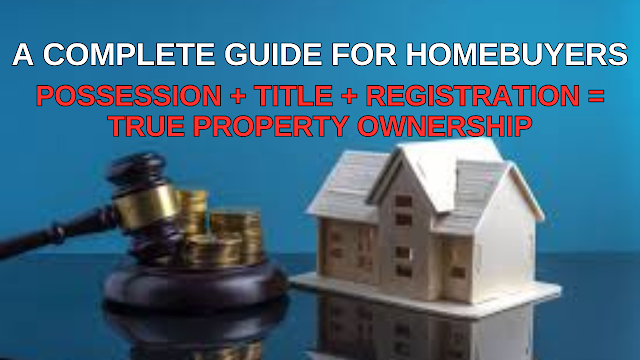True Property Ownership= Possession+ Title + Registration = A Complete Guide for Homebuyers
Introduction
In the world of real estate, people often assume that once a property is registered in their name, they are the legal owners. But the reality is more complex. According to property law and recent Supreme Court verdicts, true property ownership depends on three critical elements: Possession + Title + Registration.
This blog explains each component in detail and why all three are equally important. If you are planning to buy or sell property, understanding this formula can protect you from fraud, disputes, and legal trouble.
1. What Does Each Term Mean?
a. Title – The legal right to own a property. It means that the property is legally yours and your name is recorded as the rightful owner. Title can be proven through documents like the Title Deed, previous sale deeds, and Encumbrance Certificate.
b. Registration – This is the formal process of recording the property transaction with the government (Sub-Registrar Office) under the Indian Registration Act. Registration adds legality and timestamp to the transaction.
c. Possession – It means you have physical control over the property—you're living in it, using it, or managing it. Possession can be proven through electricity bills, property tax payments, or occupancy certificates.
2. Why Is Title So Important?
Many buyers only check the sale deed and skip verifying the title. However, a clean and valid title means:
No one else has rights over the property.
It is not mortgaged or involved in a dispute.
All earlier transfers were done legally.
Without a clear title, you don’t truly own the property—even if it’s registered in your name.
3. Why Registration Alone Is Not Enough
Recent Supreme Court judgments have clarified that registration is just a record of a transaction. It does not prove that the seller had legal ownership or title. If a seller had no right to sell, the registration becomes invalid.
Example: If A sells land to B and the land actually belongs to C, the registered deed between A and B holds no legal value because A had no title.
4. What About Possession?
Possession shows that you are physically using the property. But possession without legal title is also weak.
For example: Many tenants or encroachers may be in possession but have no ownership rights. You must combine possession with a valid title and registration.
5. The Right Formula: Possession + Title + Registration
To be a legal and rightful owner, you must have:
| Component | Purpose | Proof Documents |
|---|---|---|
| Title | Legal ownership | Title deed, EC, chain of documents |
| Registration | Government validation and public record | Registered sale deed |
| Possession | Physical control and use | Tax receipts, utility bills, occupancy |
If any one of these is missing, your ownership claim becomes weak in the eyes of law.
6. Mistakes to Avoid as a Buyer
Don’t rely only on the registered deed.
Never buy property without checking the title.
Always verify previous owners and the chain of transfers.
Avoid unregistered agreements or cash deals.
7. Legal Tips to Secure All 3 Elements
Hire a property lawyer to verify documents.
Get an Encumbrance Certificate (EC) for the past 30 years.
Check mutation records in municipal or land revenue departments.
Ensure the seller has possession and title.
Register the sale deed at the Sub-Registrar office within the legal time frame.
8. Role of Mutation in Ownership
While mutation is not proof of title, it’s a record that helps in paying taxes and proving possession. After registration, always apply for mutation of the property in your name.
9. What Happens if One Element is Missing?
Only Title + Possession, No Registration: Ownership can be challenged in court.
Only Registration, No Title: No legal ownership.
Only Possession, No Title or Registration: Treated as an illegal occupant.
Hence, only when all three are present—Title, Registration, and Possession—can you be called the legal owner.
10. Conclusion: Triple-Check Before You Buy
The simple formula—Possession + Title + Registration = True Ownership—is the best way to secure your property rights.
As a buyer:
Don’t rush.
Verify documents thoroughly.
Involve a legal expert.
A little caution today can save you from years of court cases, stress, and financial loss tomorrow.
Stay aware. Stay protected. Own with confidence.
.png)




Comments
Post a Comment